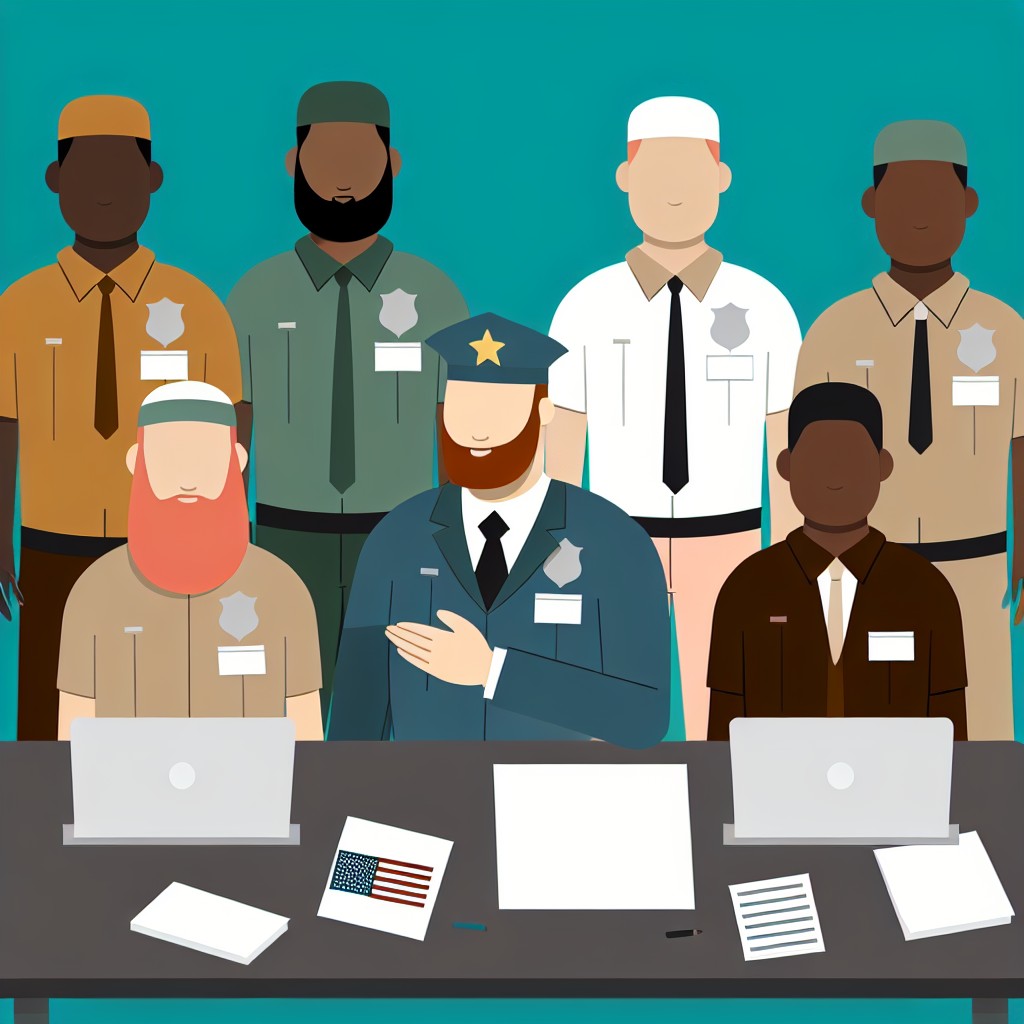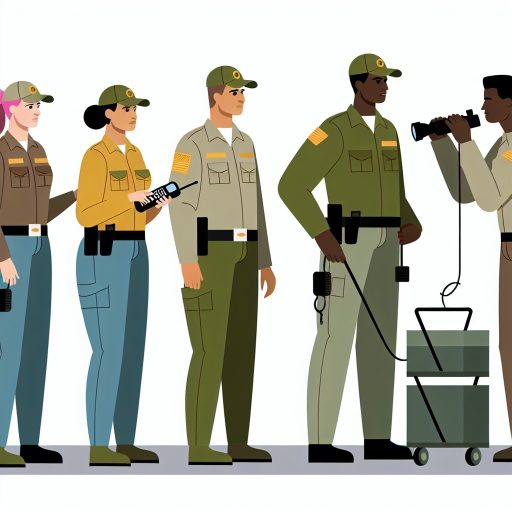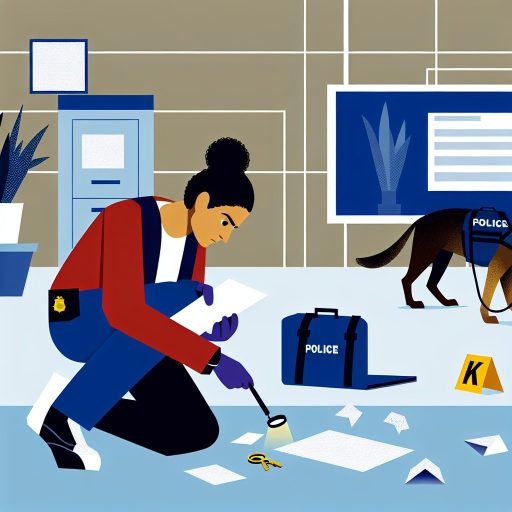Role of Correctional Officers in the Criminal Justice System
Correctional officers play a vital role in maintaining safety and order within prisons.
These officers are responsible for overseeing inmates, enforcing rules, and ensuring a secure environment within correctional facilities.
This job often exposes correctional officers to high levels of stress and burnout.
They also face potentially dangerous situations on a daily basis.
The Importance of Support Networks for Correctional Officers
Having a strong support network can make a significant difference in coping with job challenges.
Such networks provide emotional support, guidance, and a sense of camaraderie to officers.
Correctional officers can share experiences and seek advice from peers within these networks.
They also gain access to resources that improve mental health and well-being.
Supportive Resources and Professional Development Opportunities
Support networks offer valuable training and professional development opportunities to officers.
They also provide access to mental health services for managing job demands effectively.
Overall, a support network helps correctional officers feel supported and valued in their work.
It equips them to handle the unique challenges they encounter in their line of work.
Understanding the challenges faced by correctional officers
Correctional officers work in a high-stress environment.
They are constantly exposed to violence and trauma.
This environment can take a toll on their mental and emotional well-being.
Balancing personal life with work responsibilities can be particularly challenging.
Challenges
- High-stress environment
- Exposure to violence and trauma
- Balancing personal life with work responsibilities
Correctional officers face unique challenges.
These challenges can significantly impact their well-being and job satisfaction.
Effective ways to support correctional officers
It is crucial to establish support networks for correctional officers.
These networks help officers navigate challenges and maintain work-life balance.
Transform Your Career Today
Unlock a personalized career strategy that drives real results. Get tailored advice and a roadmap designed just for you.
Start NowSupport network strategies
- Peer support groups: Connecting with peers provides camaraderie and understanding.
- Counseling services: Access to counseling helps officers process trauma and stress.
- Training and education: Offering training on coping and stress management empowers officers.
- Work-life balance initiatives: Policies like flexible scheduling help prioritize personal well-being.
- Wellness programs: Programs focused on physical, mental, and emotional health support a healthy lifestyle.
By implementing these strategies, correctional officers feel more supported.
They become better equipped to handle the demands of their profession.
Benefits of support networks for correctional officers
Support networks play a key role in improving officers’ well-being and job satisfaction.
Below are important benefits of establishing these networks.
Benefits
- Reduced stress and burnout: Support networks help manage stress and prevent burnout.
- Improved mental health: Counseling and peer support reduce trauma-related issues.
- Enhanced job performance: Feeling supported helps officers perform their jobs better.
- Increased retention rates: Supportive environments encourage officers to stay long-term.
- Promotion of a positive workplace culture: Support networks foster community and belonging.
Support networks are essential for the well-being of correctional officers.
Providing supportive environments and resources helps these professionals thrive in demanding roles.
Importance of mental health support for correctional officers
- Impact of job-related stress on mental well-being
- Stigma surrounding mental health in law enforcement
- Need for access to confidential resources for support
Impact of job-related stress on mental well-being
Correctional officers are exposed to high levels of stress due to the nature of their work.
Dealing with incarcerated individuals who may pose a threat to their safety can take a toll on their mental health.
The demanding and often unpredictable environment of prisons can lead to anxiety.
It can also cause depression and other mental health issues among correctional officers.
It is crucial to address these issues promptly to prevent further escalation.
Stigma surrounding mental health in law enforcement
There is a stigma attached to mental health in the law enforcement community.
This stigma includes correctional officers.
Many officers fear being perceived as weak or incapable if they seek help for mental health concerns.
This stigma can prevent correctional officers from seeking the support they need.
It leads to negative consequences for their mental well-being.
It is essential to create a supportive environment where officers feel comfortable seeking help without judgment.
Access to confidential resources to support mental health
Correctional officers must have access to confidential resources for mental health support.
These resources should be readily available and easily accessible.
Ensuring accessibility helps officers seek help without fear of repercussions.
Transform Your Career Today
Unlock a personalized career strategy that drives real results. Get tailored advice and a roadmap designed just for you.
Start NowConfidential support networks provide a safe space for officers to discuss mental health concerns.
Officers can also seek advice and access resources for coping with stress.
Having these resources in place significantly impacts the well-being of correctional officers.
Such support improves their overall job performance.
Mental health support is crucial for correctional officers to cope with job-related stress and maintain their well-being.
By addressing stigma and providing access to confidential resources, we can create a healthier and more resilient corrections workforce.
Explore Further: Working as a TSA Officer: Insights from Industry Experts
Benefits of Having a Support Network for Correctional Officers
Correctional officers face unique challenges in their line of work.
Strong support networks are crucial for their well-being.
Below are key benefits of having such a support system.
Providing Emotional Support and Understanding
Working in a correctional facility can be emotionally taxing.
The job often involves stressful and traumatic situations.
A support network of fellow officers or professionals offers emotional support.
This network allows officers to share feelings and vent.
They also receive empathy from those who understand their struggles.
Sharing Coping Strategies and Resources
The demands of correctional work can affect mental health and well-being.
A support network provides valuable coping strategies and tips.
Officers exchange resources to manage difficult situations effectively.
By sharing experiences, they learn from one another.
This helps them develop healthier ways to cope with stress.
Transform Your Career Today
Unlock a personalized career strategy that drives real results. Get tailored advice and a roadmap designed just for you.
Start NowFostering a Sense of Community and Camaraderie
Correctional environments are often high-stress and isolating.
Such conditions can lead to burnout among officers.
A support network builds camaraderie and a strong community bond.
This bond grows from shared experiences and mutual support.
Camaraderie boosts morale and enhances teamwork.
It promotes belonging and improves job satisfaction and well-being.
Having a support network helps correctional officers maintain mental health.
It enables them to cope with job-related challenges more effectively.
Such networks also help them thrive in demanding work environments.
Emotional support, shared coping methods, and community foster officer resilience.
Explore Further: Physical Fitness Standards for Highway Patrol Officers
Types of support networks available for correctional officers
- Peer support groups within the department
- Professional organizations for law enforcement personnel
- Online forums and social media groups for sharing experiences
Correctional officers face unique challenges in their line of work.
Having a strong support network is essential for their well-being.
Here are some types of support networks available for correctional officers:
Peer support groups within the department
One of the most valuable sources of support for correctional officers is their fellow colleagues.
Peer support groups within the department provide a safe space for officers to connect with others who understand the challenges they face.
These groups often meet regularly to share experiences, offer advice, and provide emotional support to one another.
Professional organizations for law enforcement personnel
Joining professional organizations specifically designed for law enforcement personnel can also be beneficial for correctional officers.
These organizations offer a range of resources and support services, including networking opportunities, training programs, and access to mental health resources.
By becoming a member of a professional organization, correctional officers can connect with others in the field.
Transform Your Career Today
Unlock a personalized career strategy that drives real results. Get tailored advice and a roadmap designed just for you.
Start NowThey can stay informed about industry trends and access valuable support services.
Online forums and social media groups for sharing experiences
In today's digital age, correctional officers can also find support online through forums and social media groups.
These platforms provide a virtual community where officers can share their experiences, seek advice, and connect with others in similar roles.
By participating in online discussions, correctional officers can find camaraderie, support, and valuable insights from a diverse group of peers.
Having access to various types of support networks is crucial for correctional officers to navigate the challenges of their demanding profession.
By connecting with peers, joining professional organizations, and engaging with online communities, correctional officers can find the support they need to thrive in their roles and maintain their well-being.
Explore Further: TSA Officer Responsibilities Beyond Airport Checkpoints

Building a strong support network is crucial for Correctional Officers to navigate the challenges they face.
Here are five strategies to help you establish a reliable support system.
Establishing regular check-ins with colleagues
Regular communication with your colleagues can provide a sense of camaraderie and understanding.
Schedule check-ins to discuss work-related stressors and provide mutual support.
Participating in training and workshops on mental health
Attending mental health workshops can equip you with tools to manage stress and maintain emotional well-being.
It also allows you to connect with other professionals facing similar challenges.
Seeking out mentors or trusted individuals for guidance
Having a mentor or trusted individual to turn to for advice and support can be invaluable.
They can offer guidance based on their experience and help you navigate difficult situations.
Joining support groups or online communities
Connecting with other Correctional Officers in support groups or online communities can provide a safe space to share experiences.
These groups help you seek advice and find solidarity.
They can help you feel less isolated in your struggles.
Engaging in self-care activities
Practicing self-care is essential for maintaining your well-being as a Correctional Officer.
Make time for activities that bring you joy and relaxation.
Transform Your Career Today
Unlock a personalized career strategy that drives real results. Get tailored advice and a roadmap designed just for you.
Start NowExamples include exercise, hobbies, or spending time with loved ones.
By implementing these strategies, you can build a strong support network that will help you manage the challenges of being a Correctional Officer.
This network will support your mental health and overall well-being.
Uncover the Details: Career Pathways for Disaster Response Coordinators
Support Networks and Mental Wellness for Correctional Officers
Correctional officer support networks play a crucial role in the well-being of officers.
It is important for correctional officers to prioritize self-care and seek out support when needed.
Having a strong support network helps correctional officers mitigate stress and cope with challenges.
Support networks provide a safe space for officers to share experiences, seek advice, and receive emotional support.
These networks are essential for maintaining the mental health and well-being of correctional officers.
Correctional officers must recognize the importance of self-care and reaching out for help when necessary.
Seeking help is a sign of strength and vital for prioritizing mental health in high-stress environments.




